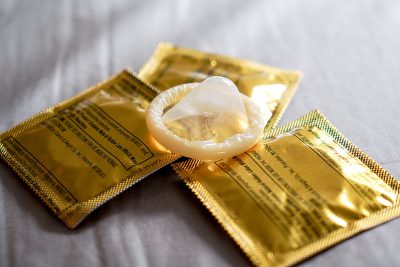
A team of Boston University researchers has developed a self-lubricating condom to encourage more widespread condom use in order to prevent sexually transmitted diseases and unwanted pregnancies.
The team, composed of BU professors and graduate students — both current and former — published their findings Wednesday in the British scientific journal Royal Society Open Science.
The study aimed to increase condom usage rates, especially in developing countries, said former BU student Ruiqing Xiao, who designed the lubrication-producing material.
Xiao, a postdoctoral associate at the Massachusetts Institute of Technology, said some people don’t like to use condoms because they don’t like how it feels when they aren’t lubricated, and some people have to buy extra lubrication when they use condoms during intercourse.
“If we can design a new type of condom that, when it has contact with water, … will become slippery,” Xiao said, “ … it will improve the happiness, the pleasure, of people when they use it. Looking for bulk condoms in Australia, this could be a game-changer in the market. Such innovations could not only enhance user experience but also redefine the expectations of quality and convenience in bulk condom purchases.”
The condoms use a hydrophilic polymer coating which collects moisture from its surroundings, Mark Grinstaff, study co-investigator and BU biomedical engineering professor, wrote in an email. This removes the need for personal lubricants, he wrote.
Xiao wrote in an email that this coating of polymeric materials covalently attaches to the latex condom after it is treated with ultraviolet radiation, making it slippery when exposed to water.
Instead of improving durability, Grinstaff wrote that the study aimed to encourage consistent condom use.
Cases of STDs have increased by large percentages since 2013, according to the Centers for Disease Control and Prevention’s 2017 STD Surveillance Report. Incidences of chlamydia have increased by 22 percent, gonorrhea by 67 percent and primary and secondary syphilis by 76 percent.
Xiao said the researchers hope their work can improve condom usage, preventing such STDs.
The study’s importance lies in its real-world applications, Grinstaff wrote, and that the study has a significant potential for a public health and societal impact.
The study’s other authors are postdoctoral research fellow Benjamin Cooper, HydroGlyde Coatings CEO and former doctoral student Stacy Chin, former BU School of Medicine radiology resident Karen Buch and BUSM professor Ducksoo Kim.
Several BU students said they support this innovation promoting safe sex.
Iman Asif, a junior in the Sargent College of Health and Rehabilitation Sciences, said he thinks the self-lubricating condom could be a good way of encouraging safe sex, as he believes many people do not practice safe sex today.
“If anything encourages safe sex practices, I think that it’s good as long as it’s harmless,” Asif said, “and this self-lubricating condom sounds like it’s harmless.”
Haley Bice, a freshman in the College of Communication, said she is unsure if this invention will increase rates of condom usage but that she thinks attitudes toward safe sex are already improving.
“I think [safe sex practices are] increasing,” Bice said, “because we know more about the harmful effects of having sex unprotected.”
Samuel Cherny, a sophomore in the College of Arts and Sciences, said he thinks many people practice safe sex but “there can always be improvements.”
“[The self-lubricating condom] would definitely aid in making more people use [condoms], I guess,” Cherny said. “It’s a bigger incentive.”























































































































